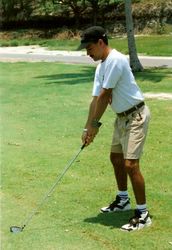By David Abel
Newsday
7/19/1998
VARADERO, Cuba -- First came the flood of dollar bills, nearly forcing the peso into extinction as a national currency. Then the T-shirts, key chains and other trinkets merchandising the notorious revolutionary martyr, Ernesto (Che) Guevara.
The Marxist state's most recent bow to bourgeois capitalism, however, required a long-term government investment: a $5 million seaside golf course.
"This was a logical extension of the tourist industry in Cuba," said Roberto Garcia, the golf course's director. "Tourists on vacation want amenities. That's what we're providing."
The Varadero Golf Club,
 which opened in April, is the first 18-hole golf course to be built in Cuba since the revolution triumphed in 1959. At least six more golf courses are being planned throughout the island, Garcia said.
which opened in April, is the first 18-hole golf course to be built in Cuba since the revolution triumphed in 1959. At least six more golf courses are being planned throughout the island, Garcia said.Rigoberto Montero, 31, a caddy who spent several years learning to manage textile factories in East Germany and who at one point gave tours of the Comandancia de la Plata, the revolution's headquarters in the Sierra Maestra mountains, winced when he first learned about the new golf course.
Then he heard about the money. Although his salary as a caddy is about $8 a month, near average for Cuban workers, he says he makes the equivalent of between $5 and $15 in tips per 18 holes.
"Sure, this is a little different," said Montero, who recently took a crash course in golf and can now casually instruct tourists on everything from a 'V' grip to the proper swing plane.
"We're not used to these things. But this is an advance for the revolution. It took a lot to build this."
The par 72 course is flanked by the Straits of Florida and a stream of Soviet Lada cars and limping 1950s Chevys and Fords. It was enlarged from an existing nine-hole course on the expropriated estate of Irenee Dupont Nemours. The chemical tycoon's renovated mansion now serves as the clubhouse, featuring a pro shop and French restaurant.
The Varadero club was designed by Golf Design Service of Toronto and is managed by Turquoise Overseas, a company based in the British Virgin Islands.
It was built, however, solely with Cuban money, Garcia said.
Cuba earned more than $1 billion last year in tourist revenue, the government reported. At least 1.2 million tourists, mainly from Europe and Canada, visited in 1997, mostly flocking to Varadero's well-known beaches. Americans are generally barred because of the U.S. embargo.
The course's manicured greens now weave between a network of saltwater lakes, 84 sand traps and three Spanish-built hotels. And golfers need not be worried by dress codes, sand rakes or slow parties.
Players can march from driving to putting in anything from cut-off jeans to tank top shirts. But golfers should avoid wearing sandals, as prickly plants speckle the ungroomed sand traps. And the long, skinny course still sports fewer than a score of players on any given day, Garcia said.
In early June, when the tropical sun makes about anything more desirable than the prospect of spending several hours unshaded, the greens were tied up, but the players were instructors and practicing caddies. Course officials have directed the staff to improve their games before the winter season, said Montero, who after four to five hours of daily practice still swings and misses the ball.
Cubans, often banned from entering hotels or nightclubs designated for tourists, are allowed to play the course - if they have the money, Montero said.
Playing 18 holes runs $60 per person, plus $10 to rent a bag of new Spalding or Tracer clubs and $10 for one of the course's 70 Yamaha golf carts. Caddies are included. For novices, there are six newly trained instructors.
Those prices were right for Goddfrey Clifton, 50, visiting from England. Ripping holes into the fresh sod with three fellow Englishmen, he said it was a pleasure to play golf in one of the world's last remaining communist countries.
"Who would have thought Cuba would have a golf course?" Clifton said. "Such an elitist sport in such a poor country that rebelled against these sort of things. The world changes."
Copyright, Newsday

